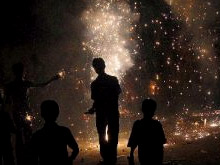Health Topics
-
Healthy Living
-
|
|
October 2009
|
| Diwali Noise: Effect of Sound |
| Dr Dev Roy |
| |
 |
Brighter sparkles and louder noise ensure a thrilling Diwali. But the high level of noise generated by fireworks may soon be replaced by a ringing in the ears, or even temporary or permanent loss of hearing. |
When crackers burst aloud in the neighbourhood, their noise reaches you and affects your ears in different ways. Any sound entering the ear passes through the eardrum and then, into the inner ear. Tiny hairs in the inner ear change the sound waves into nerve impulses. The nerves carry these impulses to the brain, where they are interpreted as sound.
Different sounds affect different parts of the ear. This allows the brain to distinguish one sound from another, like vowels from consonants. We are born with about 30,000 hair cells in the inner ear. If some of these cells are destroyed, they are not replaced. The hairs in the inner ear are very sensitive and fragile - and they can be destroyed by loud noise, or by stress of chronic noise.
The Bad Sound
The loudness of sound is measured in decibels. Normal conversation is of approximately 60 decibels, the humming of a ceiling fan is 40 decibels, while traffic noise can be around 80 decibels. Noise levels greater than 80 decibels can be hazardous. For most people, 120 decibels hurt. Firecrackers can produce sounds from 120 to 140 decibels and thus cause hearing loss. If the noise exposure is repeated, more cells are damaged and the hearing loss becomes thus permanent. If, after exposure to noise, you have a buzzing, ringing, crackling, or roaring sound in your ears, or other people's speech sounds muffled or distorted, then the noise has damaged your hearing. Feelings of ear fullness or pressure may also happen after you hear a loud noise.
These symptoms may start to go away after a few minutes or last a couple of days or longer. But the sounds in your ear, technically called 'tinnitus,' may continue constantly or occasionally throughout your life. In some cases, sudden loud noise may cause severe pain and burst the ear drum, causing instant damage to hearing. Those younger than 25 years are three times more likely to suffer hearing loss from fireworks, and men are three times more at risk than women. Some ears are more susceptible to damage than others. We don't know if this is due to heredity or ethnicity.
Besides hurting your hearing, loud noise can also affect your body in other ways. Exposure to noise can cause high blood pressure, difficulty in sleeping and mental health problems like anxiety, depression and headaches. School children and employees are found to perform at lower standards than usual, after loud noise exposure. Your poor pet dog will cringe in helplessness at the loud crackers around, because its sense of hearing is far more advanced than ours. The noise of firecrackers causes birds and animals immense distress.
Take Care
Sitting outside, watching fireworks in most cases won't hurt your hearing. Just remember to limit your time around fireworks to a minimum - moderation is the key. Remember to keep your distance. Since aerial fireworks usually burst more than 100 feet vertically away, they are likely to cause less damage, as compared to firecrackers which usually explode a few feet away. If the fireworks are in an open filed, it is likely to cause less damage, as compared to an area surrounded by buildings where the sound reverberates more.
- If your ears are ringing, or if there is a dampened or muffled sensation in your hearing after you get home, try to rest and stay away from noise. See your doctor if
- Spoken words are hard to understand
- Sounds appear slurred or mumbled, especially when there is background noise
- Certain sounds are overly annoying or loud
- You hear hissing or ringing in the ears
- TV is less enjoyable because you can't hear much
|
 |
Dr Dev Roy is Consultant, ENT/ Head & Neck Surgery at Apollo Gleneagles Hospitals, Kolkata |
|
|
|